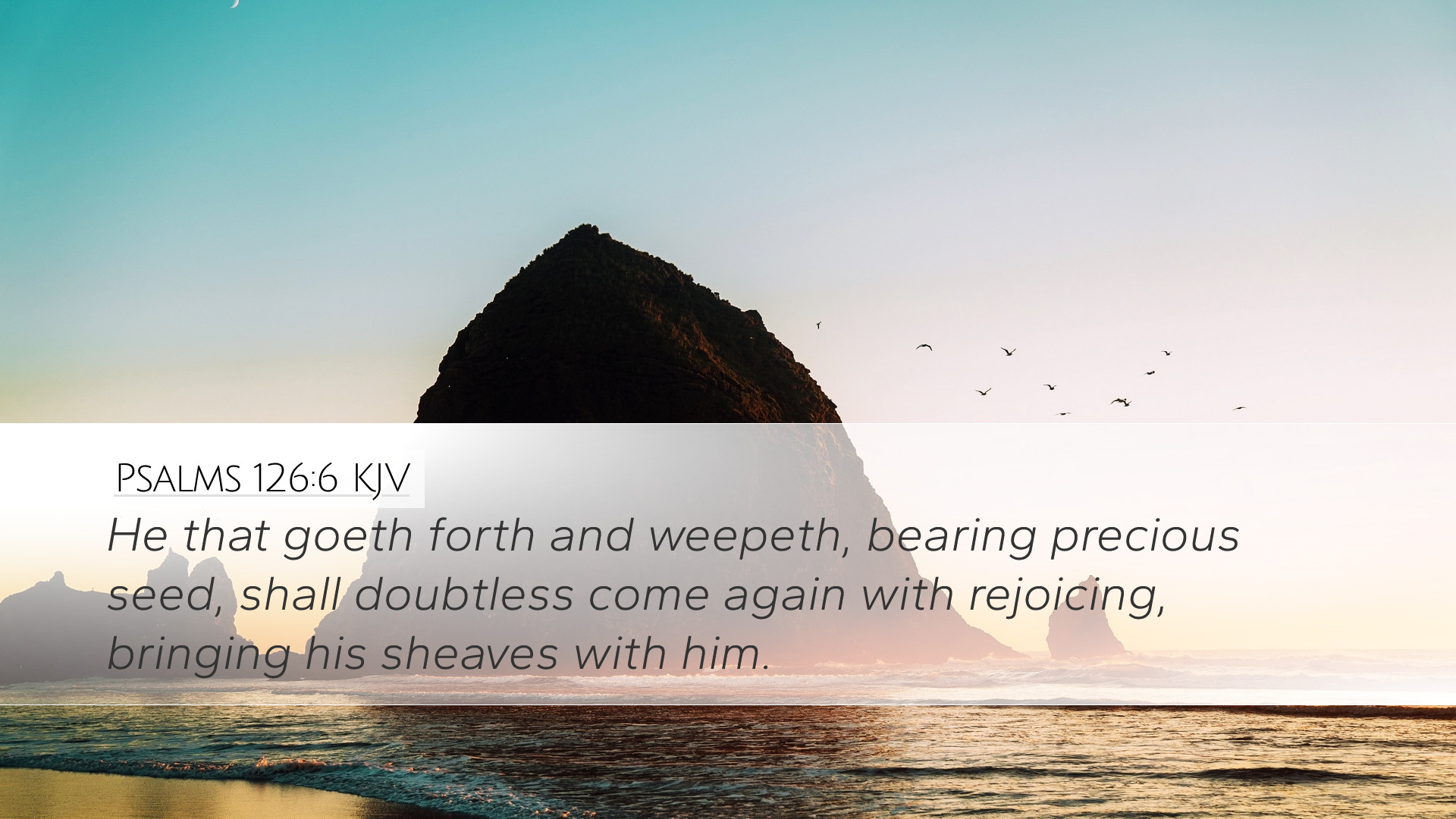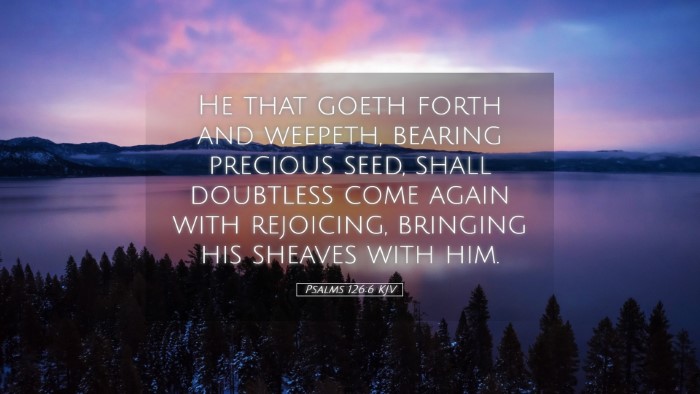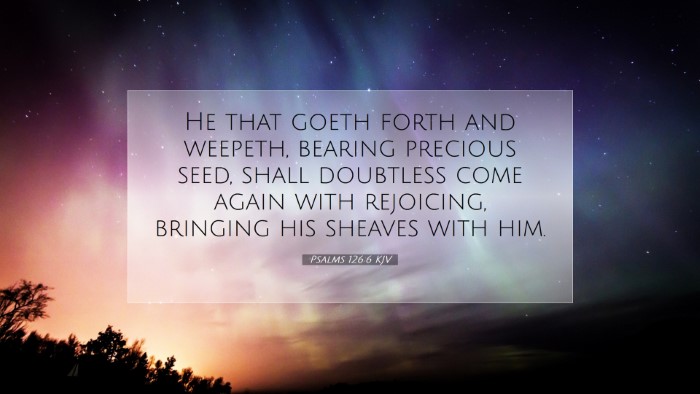Psalms 126:6 Commentary
Verse Text: "He that goeth forth and weepeth, bearing precious seed, shall doubtless come again with rejoicing, bringing his sheaves with him." (Psalms 126:6)
Introduction
The verse Psalms 126:6 encapsulates a profound truth about the nature of sowing and reaping, particularly in the context of spiritual labor and the emotional investments we make in our faith journey. It serves as both an encouragement and a promise, illustrating the divine principle that those who diligently toil in the Lord's work—often amidst sorrow and challenges—will ultimately experience joy and abundant harvest.
Insights from Commentaries
Matthew Henry's Commentary
Matthew Henry emphasizes the contrast between the sorrowful journey of the believer and the joyful outcome of their labor. He points out that the 'precious seed' represents the Word of God and the Gospel. When believers go forth with this seed, they do so during times of weeping, which can symbolize both personal grief and the plight of the lost. Henry notes that the tears signify the seriousness and passion that accompany genuine evangelistic efforts.
In Henry's view, the act of bearing precious seed is fraught with challenges and emotional struggles. However, he reassures that those who endure, despite their tears, shall return 'doubtless with rejoicing.' This confidence, he argues, rests in the promises of God and the faithful nature of His word; the harvest is assured for those who have sown in faith.
Albert Barnes' Notes on the Bible
Albert Barnes highlights the agricultural metaphor used in this verse, noting that the imagery of sowing and reaping is prevalent throughout Scripture. He explains that the ‘going forth’ suggests an active engagement in the work of God, often accompanied by hardship and mourning. Yet, Barnes points out that the precious seed symbolizes anything of value which believers invest—not only the Gospel message but also their prayers, time, and effort towards ministry.
Moreover, Barnes assures that the farmer who sows with tears shall indeed come back with joy. Here, he conveys the idea that God rewards laborers—not only in the spiritual realm but also in practical, observable ways. The promise of 'bringing his sheaves with him' emphasizes the tangible results of faithfulness and hard work in God’s kingdom.
Adam Clarke's Commentary
Adam Clarke underscores the personal and communal aspects of the verse, interpreting the sowing as a metaphor for both individual and collective sacrifices made for the sake of God’s kingdom. Clarke believes that the tears of the one who sows represent deep intercession and sorrow for those who are yet to receive salvation. He highlights the necessity of genuine emotion in ministry—real compassion is essential when reaching out to others.
Clarke further explains that the 'sheaves' denote the results of faithful ministry, which can be people converted to faith and lives transformed by the Gospel. His commentary encourages readers to engage earnestly in their call to sow the spiritual seeds, assuring them that their labor is not in vain, and the joyous return will not only replenish what was lost during the sowing but also bring increased blessing.
Theological Reflections
This verse serves as a theological reflection on the dynamics of our spiritual engagements. It emphasizes several core themes:
- Suffering and Labor: The intertwining of sorrow and service reminds believers that the path of discipleship includes trials and emotional labor. This is emblematic of Christ's own experience, as He sowed the seeds of the Kingdom through His own suffering.
- Hope in Harvest: The certainty of a joyful return reflects the Christian hope—a promise of eventual reward for faithfulness amidst difficulties. Paul echoes this theme in Galatians 6:9, where he encourages believers to not grow weary in doing good.
- Divine Assurance: The phrase 'shall doubtless come again' indicates a strong assurance from God. It cultivates confidence in His provision and faithfulness based on prior experiences of His grace.
- Communal Rejoicing: The harvested sheaves symbolize the body of Christ coming together to celebrate victories in the faith journey. The joy is most profound when it is shared among believers.
Applications for Believers
From this verse, several practical applications can be drawn for today’s believers:
- Commitment to Evangelism: Just as the psalmist speaks of going forth to sow, believers are called to actively engage in the mission of sharing the Gospel, often in the face of personal struggle.
- Endurance in Prayer: Prayer, especially intercessory prayer, is akin to sowing precious seed. The emotional investment reflects our heart for the lost and the importance of depending on God’s power.
- Community Support: The journey is not solitary; creating a supportive community can help carry burdens and celebrate victories, reinforcing the idea that laboring together bears more fruit.
Conclusion
Psalms 126:6 serves as a timeless reminder for pastors, students, theologians, and scholars about the cyclical nature of spiritual work—where sacrifice and sorrow are often prerequisites for joy and harvest. As such, it encourages us to embrace our role in God’s field with unwavering hope that our efforts, enveloped in sincerity and love, will yield a bountiful harvest. It challenges believers not only to acknowledge their emotional investments but to see them as integral to the ministry of reconciliation that God has called us all to participate in.


